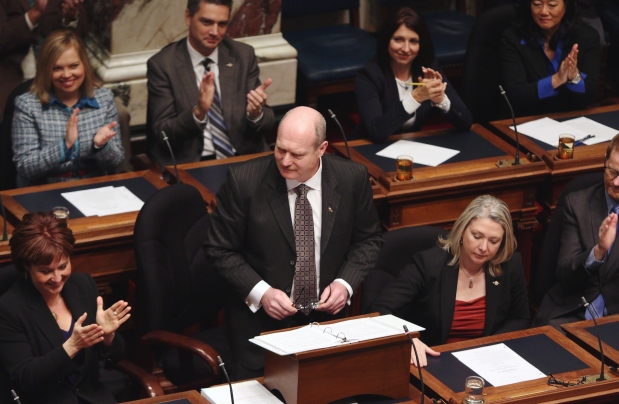Barbara Yaffe
The Vancouver Sun

B.C. Finance Minister Mike de Jong delivers the 2016 provincial budget next Tuesday, Feb. 16. Photograph by: CHAD HIPOLITO , THE CANADIAN PRESS
Exasperated by all those $1.5-million fixer-uppers out there that, anywhere else, might sell for around $275,000? Counting on Christy Clark’s recent pledge to deliver relief?
The B.C. budget, to be tabled next Tuesday, will almost certainly bring you back down to earth.
The premier, in advance of the budget, says housing relief is a top issue for her government.
And it should be. In the past year alone, prices have increased between 14 and 24 per cent, depending on housing type. Royal Lepage expects Vancouver prices to rise another nine per cent in 2016.
But most analysts agree that the province is unlikely to do more than tinker around the margins of the affordability crisis, with its focus on first-time buyers, a group reflecting only 30 per cent of buyers, therefore not a terribly costly one to assist.
Clark laid her cards on the table last year. She stated her government will do nothing that might harm people’s home equity.
That, by definition, means not easing the competitive forces driving equity gains. Forces like house flipping and foreign buying, which are at the root of the price escalation.
Notwithstanding a plea the other week from a group of B.C. economists for a non-resident real estate tax, industry consultant Michael Geller predicts the Feb. 16 provincial budget won’t include tax changes applicable to foreign buyers or vacant units.
Municipal development charges, which the premier has long blamed for high prices, and new building code requirements, which developers grouse about, also add costs, but they pale next to demand forces.
Politically, Clark’s is a logical strategy. At any given time, there are more people with home equity — 40 per cent of Lower Mainlanders — than there are home buyers confronting high prices. Only 30,000 to 40,000 MLS sales occur annually.
If B.C. acts on Mayor Gregor Robertson’s appeal for a speculation tax or special levy on luxury homes, that could cool the market, ease pricing pressures, perhaps even prompt prices to decline.
So, the most likely targets for provincial action are the transfer tax and property taxes.
- The Property Transfer Tax could be adjusted in the budget in favour of making more first-time buyers exempt. As well, the government could impose a higher transfer tax on purchasers of multi-million-dollar homes, to subsidize buyers at the low end of the market. The tax, say Micheal Ferreira and Jon Bennest of Urban Analytics, ought to be adjusted automatically over time, as house values change. And buyers of expensive property who haven’t been paying income tax in B.C. should pay higher PTT.
- On property tax, urban development specialist Bob Ransford would like to see a surcharge, applying to homes that are not an owner’s primary residence, with revenues directed to affordable housing.
Geller believes the budget might introduce a sliding scale to reduce property tax for lower-priced properties and increase it for expensive properties.
He would like property taxes shifted so multi-family units — which are more resource efficient and use less infrastructure — would carry less property tax than single-family homes, even where assessed value is equivalent.
Ferreira and Bennest want the property tax deferral program extended to younger buyers.
All interesting suggestions, but, it should be noted, the province has never shown much generosity when it comes to housing affordability.
The finance ministry has only incrementally adjusted the Property Transfer Tax over the years — homebuyers these days pay more transfer tax as a percentage of a home’s value than in the past. And the province has taken full advantage of the windfall, raking in more than $1 billion last year.
Where the $570 Homeowner’s Grant is concerned, the Clark government has been equally stingy. Back in 2013, the homeowner grant eligibility threshold offered relief to 95.5 per cent of B.C. homeowners. Today, only 91 per cent remain eligible.
Based on past experience, housing relief in next week’s budget is apt to be selective and sparse.
© Copyright (c) The Vancouver Sun





